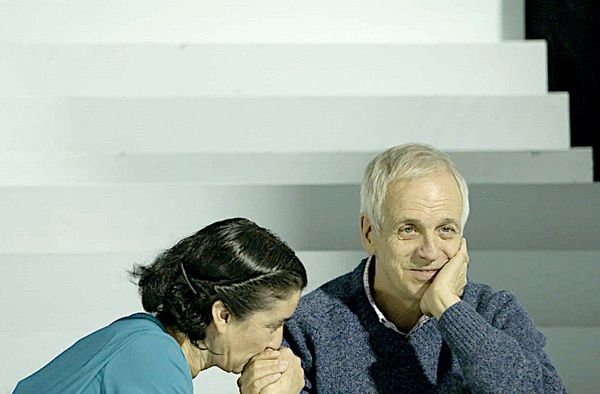 |
| Paulina Urrutia with Augusto Góngora in Maite Alberdi’s The Eternal Memory: “Raul Ruiz and Augusto are alive in the film. So the film is resurrecting them, too. Cinema as a way of resurrection.” |
The first time I spoke with Maite Alberdi was in 2021 on Zoom from Santiago, Chile for a conversation on The Mole Agent (El Agente Topo, which received a Best Documentary Feature Oscar nomination), so I was happy to meet her in person last week at the Crosby Street Hotel invited screening of her latest film, The Eternal Memory (La Memoria Infinita, World Documentary Competition Grand Jury Prize at Sundance), as Nancy Buirski’s plus-one. Following the Q&A, moderated with great flair by Kirsten Johnson, Maite and I had the chance to reconnect at the reception.
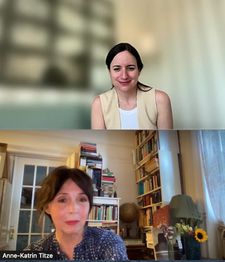 |
| Maite Alberdi with Anne-Katrin Titze on the No poster: “It’s the same graphics that Pablo Larrain used for his film.” |
Augusto Góngora, famous for his television culture program and during the Pinochet regime, his clandestine work to archive what was really going on in Chile, has Alzheimers. His wife, Paulina Urrutia, an actress and former Chilean Minister of Culture takes care of him. For over a quarter of a century they had loved each other and their deep connection is obvious throughout. We see it in the home movies and in the footage shot by Alberdi closer to the onset of his illness, and far into pandemic times when Paulina was the one in charge of filming them at home with the world in lockdown. Not always in focus and from unexpected angles, Paulina is the first to admit that her filming technique is not that professional. It is precisely these intimate glances one never sees which lift the horizons into revelation.
Augusto awakes, and we witness Paulina’s gentle questioning. Who are you? Am I this or that? Who are these people in the wedding photograph? Anything but in linear procession, the film never allows us to pinpoint stages in the map of his memory. His smile is a powerful presence, as if to say: Hey, even if I don’t recognise you, I really like this person in front of me, as though he falls in love with her over and over again each day. It doesn’t always work that way and fear takes over, in devastating flashes of despair and cries for help, as when Augusto is afraid of losing his books and all they mean for his full life.
One of the days, Paulina is the one who almost breaks down, when it took him until the afternoon to recognise her. A third presence, absent from their house is Maite, who receives Paulina’s footage daily like a diary to assemble this remarkable documentary. There is a small, but not unimportant fourth participant, whose presence felt significant without my clearly understanding why.
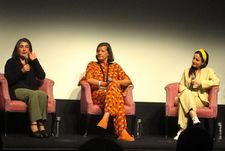 |
| Kirsten Johnson with Paulina Urrutia and Maite Alberdi at the Crosby Street Hotel Photo: Anne-Katrin Titze |
Only after talking to Paulina at the Crosby Street reception, did I grasp some of it. The couple’s tailless cat, Giulietta (“I’m an actress, so of course” Paulina explained), who is glimpsed a few times in the film, at one point began mirroring Augusto’s symptoms. He went blind, so did the cat. He couldn’t walk anymore, the cat began to limp. Augusto died in May of this year, 2023, as did Giulietta a few hours later the same day. Paulina and Maite with every appearance and Q&A surrounding the film carry Augusto with them. His spirit was felt that night in SoHo as memory has a way to triumph over death.
As she did with her utterly charming Oscar-nominated documentary, The Mole Agent - the story of an 80-plus gentleman hired to spy on the goings-on in a Chilean nursing home - Maite Alberdi in The Eternal Memory defies all clichés in her approach towards universally dreaded truths of life. Aging, memory loss, death turn into an exploration of love and what a real partnership can look like.
From Los Angeles, Maite Alberdi joined me on Zoom for an in-depth conversation on The Eternal Memory.
Anne-Katrin Titze: Hi Maite! It was so nice to see you last week in person!
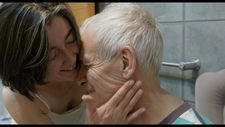 |
| Maite Alberdi on Paulina Urrutia and Augusto Góngora: “You live love, you live with humour, you live with so many emotions at the same time.” |
Maite Alberdi: Hi, it was really good to see you!
AKT: You’re in LA right now with Paulina?
MA: Yes, I’m in LA right now with Pauli.
AKT: I just finished writing a review of a film about Simone Veil, the French Health Minister, first President of the European Parliament, survivor of the Shoah [Olivier Dahan’s Simone: Woman Of The Century]. There is a sentence she says about people being scared of other people’s suffering. Your films go where people’s fears lie - aging, death, memory loss and you turn it into something else, something manageable in some respect. Am I on the right track?
MA: Yeah, completely. I think the only way to live is to face fears and to face pain. It’s so like, how can you live after that? It’s like how to be brave to go through the pain and understand that the pain is not only pain. You live love, you live with humour, you live with so many emotions at the same time. And after that experience you put life in perspective.
AKT: Your film impressed me very much when I saw it last week. When I spoke with Paulina afterwards, I asked her about the cat without a tail, Giulietta. And she told me this incredible story how in a way the cat’s symptoms mirrored Augusto’s. And I remembered that when we spoke about The Mole Agent you said about the cats and the flowers that they are “necessary rest.”
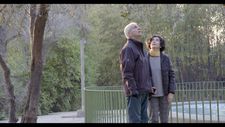 |
| Maite Alberdi on Augusto Góngora and Paulina Urrutia: “I think the only way to live is to face fears and to face pain.” |
MA: Ha! Yes! The cat is different here than in The Mole Agent, but the cat is a presence in their life and the cat, she passed away two hours after Augusto, so it was like really unbelievable. They are part of the experience.
AKT: The three of them in this house during COVID - these moments were filmed by Paulina, right?
MA: Yes!
AKT: You were the one who filmed the theatre scenes? Tell me a bit about how that switch happened!
MA: I shot the theatre experience. I shot them for two years and a half before the pandemic arrived and then Paulina took the camera. It was an exercise - it was not like, you have to make a film! It was more like, let’s continue to record without understanding really what is going to happen and let’s move forward. And we see the camera as company in a way for both of us. For her it was an excuse to do something and to be in communication. It was our diary that we shared during the pandemic.
After two years I realised that the material has a really powerful intimacy that I didn’t have in my material. It was only in material that a couple can record of themselves. And that was so particular, that we have that intimacy. I always said this is a film recorded by the three of us. Augusto with his camera thirty years ago, then it’s Paulina’s camera, and my camera. So it’s a collective register of three generations in three different moments of their life.
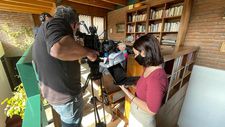 |
| Maite Alberdi with cinematographer Pablo Valdés filming The Eternal Memory |
AKT: The result is completely universal. Audiences in Chile know him as a television presence and know her as an actress and Chilean Minister of Culture - are the responses different in Chile than in places where audiences meet them for the first time?
MA: I think it’s the same response because I think that the film explains really well who they are. But the important thing is not who they are, but the relationship that they have. And that is particular and universal for my country and for all other countries. If you know them or don’t know them, because it’s an experience that you don’t expect even if you had been seeing them on television for many years. You don’t really know how their intimacy is. I think it’s a unique experience for everyone.
AKT: It’s interesting that both of them have the combination of activism and politics and culture.
MA: Exactly! And that activism, politics and culture - it’s a way of life. It’s not only a job. It’s a way how to understand relationships. It’s a way to understand how you want to move in life. It’s related with the love. It’s not separated worlds.
AKT: Clearly it is part of the love you feel, even when the memory fades through dementia, through Alzheimers, it’s still there.
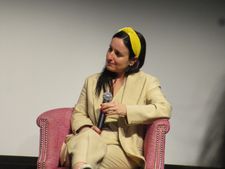 |
| Maite Alberdi at the Crosby Street Hotel Photo: Anne-Katrin Titze |
MA: Yes!
AKT: There is a presence of something that doesn’t wane, which makes it so hopeful.
MA: Completely.
AKT: I noticed a detail in their house, a poster with a big NO. And Pablo Larraín, one of the producers of your film, made a film about that campaign.
MA: The poster of NO is not the poster of the film.
AKT: It’s the real one!
MA: It’s the real one, the poster of the political campaign that people did to take out Pinochet for democracy. So, yes, it was the original one. It’s the same graphics that Pablo Larrain used for his film.
AKT: I thought it’s great how you can see it in the background.
MA: Yeah, that house! It’s great that you saw it.
AKT: And the birds! I used to have a cat and a bird at the same time and it takes a certain kind of person to work with that.
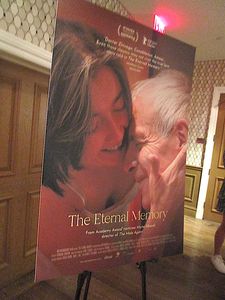 |
| The Eternal Memory poster at the Crosby Street Hotel Photo: Anne-Katrin Titze |
MA: Yes, the birds are the “rest” of this film - as the flowers and the cats were in The Mole Agent. The birds are the music of that house.
AKT: Raul Ruiz is obsessed with resurrecting the dead! That is a very nice side comment!
MA: It is amazing, because that archival appeared in a VHS in the house. That material was never screened on TV. While shooting we found it. And Augusto was such a close friend and so obsessed with Raul that I really like that idea of resurrecting people. I think the memory as we construct it is a way of resurrecting ideas and resurrecting the past. And Raul Ruiz and Augusto are alive in the film. So the film is resurrecting them, too. Cinema as a way of resurrection.
AKT: Resurrection! Not just, as Kirsten Johnson put it after your screening, cinema as a graveyard.
MA: No, it’s resurrection!
AKT: The scene with the books, Augusto fearing the loss of his books is powerful because it is so heartbreaking. It also speaks of things that remain of us and how memory remains somewhere - in books, in films, in places.
MA: Exactly, it remains in different ways. And the books are so meaningful in this film because they are meaningful for Augusto in many ways. It represents a TV program that he had that was called the Book Show in which he interviewed one writer per week. And he spoke about books. So for him a book is an excuse to speak with artists; for him the books were an excuse to be with friends. The books were an excuse to see another world.
And a book was what he fought for during the dictatorship - he created that book that said all the things that happened in the country in these years. So to be losing the books for him it’s a way to be losing life. That’s why that scene is so meaningful.
 |
| Crosby Street Hotel Photo: Anne-Katrin Titze |
AKT: And there is again the link between politics, culture, and connection between people! You made a very impressive film, thank you! And I also have greetings for you from Nancy Buirski, whom I introduced you to at the reception last week.
MA: Yes, gracias!
AKT: You are on your campaign - I wish you a lot of energy! Till next time!
MA: See you! Thank you!
The Eternal Memory is in cinemas in the US.





















